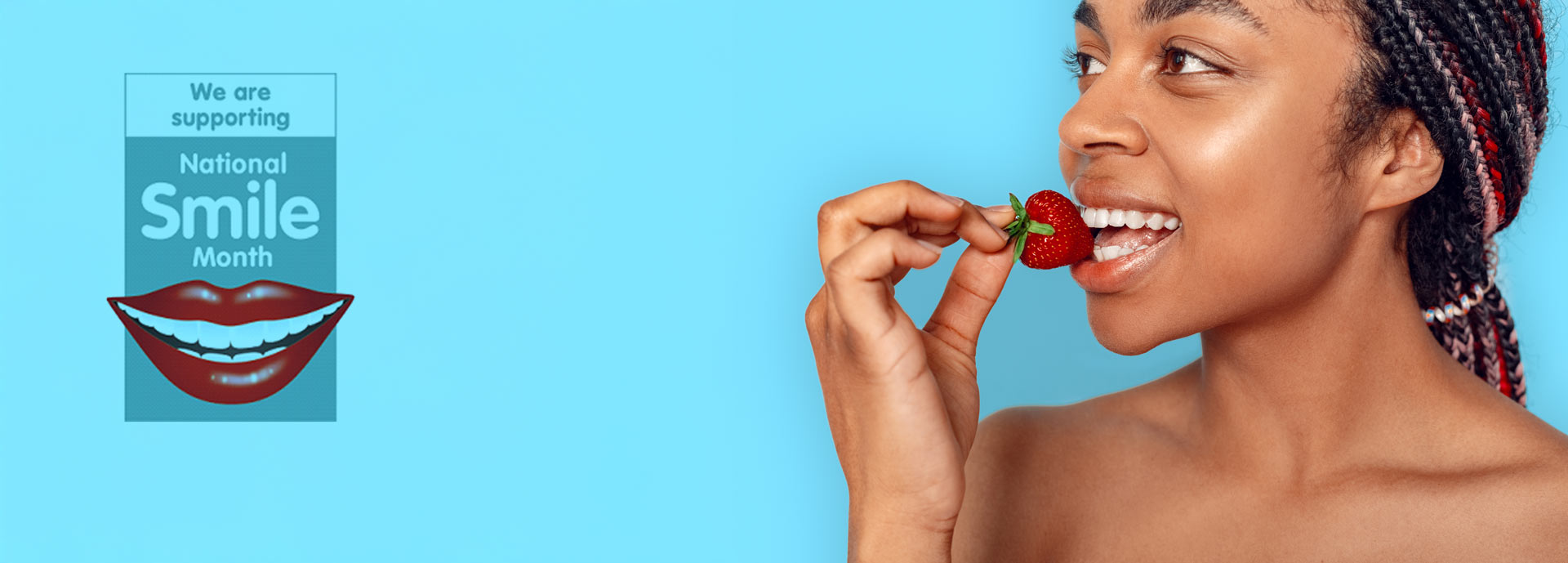National Smile Month (12 May to 12 June) is in full swing and it’s the perfect time to shine a light on the small choices that make a big difference to your oral health. Celebrated annually, National Smile Month is all about promoting good oral hygiene and raising awareness around dental health. This year’s theme, ‘Feed Your Smile’, focuses on the connection between what we eat and the health of our teeth and gums.
In this blog, we’re embracing the theme by sharing 10 foods that can help you maintain a bright and healthy smile. Good nutrition plays a key role in supporting strong teeth, healthy gums, and fresh breath. The right foods help your body produce saliva, neutralising harmful acids, remineralising enamel, and providing the nutrients needed to fend off decay and gum disease.
10 foods that will feed your smile
- Cheese
Cheese is a dental superfood. It’s rich in calcium and phosphorus, two minerals that strengthen tooth enamel and help protect against erosion. Cheese also helps balance the pH in your mouth, reducing acid levels and lowering your risk of tooth decay. - Leafy greens
Spinach, kale, and other leafy greens are packed with calcium and phosphorus, which are essential for healthy teeth and bones. They’re also high in folic acid, a type of B vitamin that may help treat gum inflammation during pregnancy. - Strawberries
Strawberries are a great source of vitamin C, which supports gum health by boosting collagen production. A healthy dose of vitamin C helps prevent gum disease, while the malic acid in strawberries may even help whiten your teeth naturally. - Celery
With its crunchy texture and high fibre content, celery acts like nature’s toothbrush. It stimulates saliva production, helping wash away food particles and bacteria. - Yoghurt and kefir
These fermented dairy products are rich in calcium and probiotics. There’s growing evidence of a strong link between gut health and oral health – known as the oral-gut axis. A healthy gut microbiome supports immune function and reduces inflammation, helping your body fight off oral infections and gum disease. Choose plain, unsweetened yoghurt with live cultures, or try kefir, a fermented drink full of beneficial bacteria. - Kimchi and sauerkraut
Like yoghurt and kefir, these fermented vegetables are loaded with probiotics that help support both gut and oral microbiomes. A balanced bacterial environment in your digestive system contributes to healthier gums, fewer cavities, and improved immune function. - Salmon
Fatty fish like salmon is an excellent source of vitamin D, which helps your body absorb and use calcium effectively. Without enough vitamin D, teeth can become weak and more susceptible to decay. Salmon also contains omega-3 fatty acids, which may help reduce inflammation in the gums. - Citrus fruits
Oranges, grapefruits, and lemons are high in vitamin C, which is vital for healthy gums. It strengthens blood vessels and connective tissue, helping to ward off gum inflammation and periodontal disease. Just be sure to rinse with water afterwards, as citrus is also acidic and can weaken enamel. - Nuts
Almonds, walnuts, and cashews are full of fibre and healthy fats. Their crunchy texture helps stimulate saliva production, cleaning teeth naturally. Many nuts also contain calcium and phosphorus, adding to their oral health benefits. - Wholegrains
Wholegrain foods like brown rice, oats, and wholegrain bread are high in fibre, which encourages chewing and increases saliva flow. Unlike refined carbohydrates, wholegrains break down more slowly and are less likely to stick to your teeth or feed harmful bacteria.
6 foods to avoid for a healthy mouth
While some foods support a healthy mouth, others do just the opposite. Here are six common culprits that can damage your smile:
- Sugary sweets and snacks
Sugar feeds bacteria in your mouth, leading to acid production that wears down enamel. Sticky sweets like toffees are especially harmful as they cling to teeth longer. Limit cakes, biscuits, and chocolates where possible. - Sugary and fizzy drinks
Fizzy drinks and sports drinks are full of sugar and acid, both of which weaken enamel and increase the risk of cavities. - Acidic fruit juices
Citrus juices, while rich in vitamin C, can be highly acidic, which can erode enamel with frequent exposure. Try drinking juice through a straw and rinse your mouth with water afterwards to reduce its impact. - White bread and refined carbohydrates
These foods quickly break down into sugars in your mouth and can easily get lodged between teeth. This feeds bacteria and increases cavity risk. Swap them out for wholegrain versions when you can. - Dried fruits
Although they may seem like a healthy snack, dried fruits like raisins and dates are sticky and high in sugar, making them just as risky for your teeth as sweets. Opt for fresh fruit instead. - Alcoholic drinks
Alcohol dries out your mouth, reducing saliva production and leaving teeth more vulnerable to decay. Acidic options like wine and sugary mixers in cocktails can also erode enamel over time.
Extra tips:
- Drink water after eating sugary or acidic foods to help rinse your mouth.
- Use a straw when drinking acidic or sugary beverages to minimise contact with your teeth.
- Limit snacking, as frequent eating gives harmful bacteria more time to produce acids.
- Wait 30 minutes before brushing after acidic foods or drinks to protect your enamel from damage.
Feeding your smile doesn’t have to be complicated! Smart food choices go a long way in protecting your teeth and gums. By adding smile-friendly foods and being mindful of the ones to avoid, you’ll not only boost your oral health but support your overall wellbeing too.
Interested in learning more or have a question about oral hygiene? Visit our Oral Health Advice page for tips, tricks and advice to look after your mouth and teeth.



